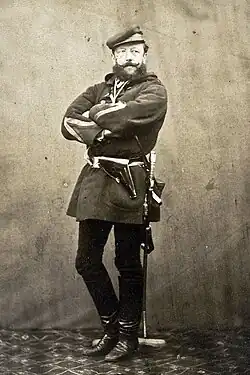Józef Hauke-Bosak

Józef Hauke-Bosak (19 March 1834 – 21 January 1871) was a Polish military leader of the January Uprising. A close ally of rebellion leader Romuald Traugutt, Hauke-Bosak commanded the Polish Army in Lesser Poland, where he fought many successful battles against the Russians. He left Poland after the uprising collapsed in 1864. Hauke-Bosak was killed in battle while serving in the French Army during the Franco-Prussian War.
Biography
Hauke-Bosak was born in Saint Petersburg on 19 March 1834, the son of Józef Hauke, an aide-de-camp to Tsar Nicholas I and former officer in the Army of the Duchy of Warsaw, and Karolina Steinkeller.[1] He was a nephew of Piotr Antoni Steinkeller, a prominent industrialist, and a cousin to Countess Julia von Hauke, Princess von Battenberg.[2] After his military education in Saint Petersburg, Hauke-Bosak began a brilliant career in the Russian Imperial Army.[1] He served in the Caucasus War and reached the rank of colonel.[1]
In 1863, Hauke-Bosak left the Russian Army and took up arms for the January Uprising in Poland.[1] He was appointed general by the Polish National Government and took command of troops in Lesser Poland, becoming a close ally of rebellion leader Romuald Traugutt.[1] Hauke-Bosak emigrated to Dresden in April 1864, following the uprising's defeat, then moved to Geneva and Italy, where he joined Giuseppe Garibaldi.[1] He settled in Geneva in 1867, where he was active in the Polish émigré community as a member of the committee of the Union de l'émigration polonaise and the Foyer polonais.[1]
Hauke-Bosak adhered to the League of Peace and Freedom and notably authored La Grève (1869) and Manuel d'organisation et de combat for the workers of Le Creusot.[1] On the outbreak of the Franco-Prussian War, he joined the Army of the Vosges, a volunteer unit in the French Army led by Garibaldi, and was given command of its 1st Brigade.[1] Hauke-Bosak was killed in action at the Third Battle of Dijon on 21 January 1871, aged 36.[1] He was buried in Carouge in the canton of Geneva.[1]